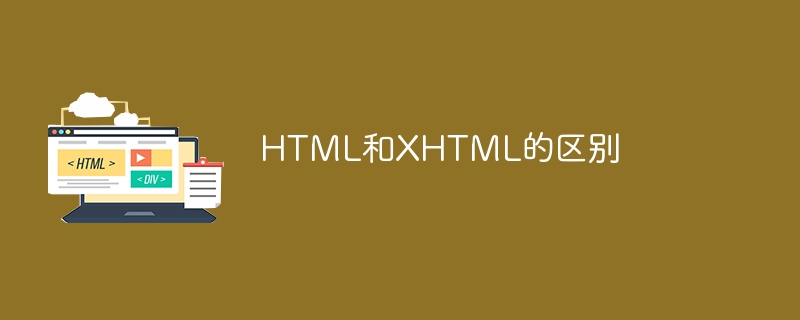HTML和XHTML的差別

HTML和XHTML是用來開發網頁的電腦語言。它具有簡單的語法,易於理解。 XHTML是HTML的擴展,也結合了XML的特性。它比HTML有更嚴格的語法。儘管XHTML是從HTML衍生出來的,但這兩者之間有相當大的差異。
什麼是HTML?
HTML的全名為超文本標記語言。它是由Tim Berners Lee於1993年開發的。它是標準通用標記語言(SGML)的擴展形式。 HTML為網頁開發提供了基礎或骨架。
超文本是透過超連結將一個頁面連結到另一個頁面,並在點擊時啟動的文字。標記語言是使用標籤來設計網頁並使其看起來更具吸引力的語言。超文本標記語言用於從基本層級連接多個頁面開發網頁。
所有的元素在html中都是透過html標籤來定義的。標籤就像是關鍵字,幫助以不同的格式排列元素。 HTML不是一種程式語言。
優勢
這很簡單,初學者也能輕鬆理解
HTML被所有瀏覽器支援
它可以在任何作業系統上運行,因此具有平台無關性
它是免費的,並且在Windows中預設可用
#It is light weighted and loads faster
它的文法很容易學習
它可以輕鬆地與CSS、JavaScript和其他語言整合
Disadvantages
它無法產生動態輸出
#Even a simple webpage requires number of lines of code
#It doesn’t provide security
Even there is an error in the syntax, it runs it. But we don’t get the desired output
我們不能只使用HTML來建立完整的網頁。它只能建立基本的網頁
What is XHTML?
XHTML stands for Extensible hypertext markup language. It was developed by World Wide Web Consortium (W3C) and released in the year 2000. It has the characteristics of both HTML and XML.
它與HTML幾乎相似,但比HTML嚴格得多。 XHTML的主要原因是HTML在保護其原始碼方面過於寬鬆。 XHTML更靈活,可以輕鬆轉換成其他格式。
Every XHTML document consists of three main parts. They are −
DOCTYPE − Used to declare the type of document
Head − 用於宣告標題和其他屬性
Body − Part that consist of the actual content that a web page contains
優勢
It follows strict rules hence reducing errors
#它讓程式碼易讀
#它提供了更多的安全性,原始碼不容易被存取
#As it follows all the rules of XML, it is easy to convert to other formats
All web applications are moving towards XML. Hence it is good to use XHTML than HTML as it has more scope in future
使用此工具建立的網頁具有可移植性。它的簡單性使其能在處理器較小的設備上運行
Disadvantages
Beginners find it difficult to learn
Only few browsers support XHTML. Hence its practical use is limited
#HTML vs XHTML
The following table highlights the major differences between HTML and XHTML −
參數 |
HTML |
XHTML |
|---|---|---|
#Full form |
HTML stands for Hyper Text Markup Language |
XHTML代表可擴充超文本標記語言 |
#Developed by |
#HTML was developed by Tim Berners Lee |
XHTML was developed by World Wide Web Consortium (W3C) |
Release date |
#It was released in 1993 |
#It was released in 2000 |
#File format |
It is of document type file format |
它是以標記語言檔案格式儲存的 |
Extended from |
#HTML是從SGML(標準通用標記語言)擴展而來的 |
It is extended from HTML and XML (Extensible markup language) |
File extension |
#It has the file extensions - .html, .htm |
#它有副檔名 - .xhtml,.xht,.html,.htm,.xml |
Case sensitivity |
HTML is not case sensitive. It can be written in upper case or lowercase or a combination of both |
XHTML is case sensitive. All the code should be in lower case |
DOCTYPE |
在HTML中,每個頁面的開頭不需要新增 |
#在XHTML中,每個頁面的頂部都必須提及 |
閉合標籤 |
In HTML, it is not mandatory to close the tags |
#在XHTML中,關閉所有標籤是強制性的 |
#屬性 |
While writing attributes in HTML, it is not necessary to mention them in double quotes Ex :- |
#需要在引號中提及屬性值 Ex :- |
#Nesting |
不需要巢狀元素 |
#In XHTML, elements should be nested properly in an order |
嚴格性 |
HTML is lenient compared to XHTML |
XHTML strictly follows rules |
Structure of code |
#它的程式碼不夠有組織性 |
它有更有組織的程式碼 |
錯誤 |
即使其中包含錯誤,它仍然可以運行程式碼 |
它嚴格檢查所有錯誤 |
#解析 |
Its source code can be accessed easily |
存取其原始程式碼有些困難 |
安全 |
HTML不夠安全 |
#XHTML provides more security |
#瀏覽器相容性 |
HTML被所有瀏覽器支援 |
Only few browsers support XHTML |
Complexity |
It has simple syntax and can be understood easily |
Beginners find it difficult to understand |
結論
HTML和XHTML的主要目標是建立網頁。 XHTML是HTML的擴充版本,它遵循更多規則,並且相對於HTML來說更加嚴格。 XHTML可以輕鬆轉換成其他資料格式。
以上是HTML和XHTML的差別的詳細內容。更多資訊請關注PHP中文網其他相關文章!

熱AI工具

Undresser.AI Undress
人工智慧驅動的應用程序,用於創建逼真的裸體照片

AI Clothes Remover
用於從照片中去除衣服的線上人工智慧工具。

Undress AI Tool
免費脫衣圖片

Clothoff.io
AI脫衣器

Video Face Swap
使用我們完全免費的人工智慧換臉工具,輕鬆在任何影片中換臉!

熱門文章

熱工具

記事本++7.3.1
好用且免費的程式碼編輯器

SublimeText3漢化版
中文版,非常好用

禪工作室 13.0.1
強大的PHP整合開發環境

Dreamweaver CS6
視覺化網頁開發工具

SublimeText3 Mac版
神級程式碼編輯軟體(SublimeText3)
 HTML容易為初學者學習嗎?
Apr 07, 2025 am 12:11 AM
HTML容易為初學者學習嗎?
Apr 07, 2025 am 12:11 AM
HTML適合初學者學習,因為它簡單易學且能快速看到成果。 1)HTML的學習曲線平緩,易於上手。 2)只需掌握基本標籤即可開始創建網頁。 3)靈活性高,可與CSS和JavaScript結合使用。 4)豐富的學習資源和現代工具支持學習過程。
 HTML,CSS和JavaScript的角色:核心職責
Apr 08, 2025 pm 07:05 PM
HTML,CSS和JavaScript的角色:核心職責
Apr 08, 2025 pm 07:05 PM
HTML定義網頁結構,CSS負責樣式和佈局,JavaScript賦予動態交互。三者在網頁開發中各司其職,共同構建豐富多彩的網站。
 了解HTML,CSS和JavaScript:初學者指南
Apr 12, 2025 am 12:02 AM
了解HTML,CSS和JavaScript:初學者指南
Apr 12, 2025 am 12:02 AM
WebDevelovermentReliesonHtml,CSS和JavaScript:1)HTMLStructuresContent,2)CSSStyleSIT和3)JavaScriptAddSstractivity,形成thebasisofmodernWebemodernWebExexperiences。
 Gitee Pages靜態網站部署失敗:單個文件404錯誤如何排查和解決?
Apr 04, 2025 pm 11:54 PM
Gitee Pages靜態網站部署失敗:單個文件404錯誤如何排查和解決?
Apr 04, 2025 pm 11:54 PM
GiteePages靜態網站部署失敗:404錯誤排查與解決在使用Gitee...
 HTML中起始標籤的示例是什麼?
Apr 06, 2025 am 12:04 AM
HTML中起始標籤的示例是什麼?
Apr 06, 2025 am 12:04 AM
AnexampleOfAstartingTaginHtmlis,beginSaparagraph.startingTagSareEssentialInhtmlastheyInitiateEllements,defiteTheeTheErtypes,andarecrucialforsstructuringwebpages wepages webpages andConstructingthedom。
 如何用CSS3和JavaScript實現圖片點擊後周圍圖片散開並放大效果?
Apr 05, 2025 am 06:15 AM
如何用CSS3和JavaScript實現圖片點擊後周圍圖片散開並放大效果?
Apr 05, 2025 am 06:15 AM
實現圖片點擊後周圍圖片散開並放大效果許多網頁設計中,需要實現一種交互效果:點擊某張圖片,使其周圍的...
 網頁批註如何實現Y軸位置的自適應佈局?
Apr 04, 2025 pm 11:30 PM
網頁批註如何實現Y軸位置的自適應佈局?
Apr 04, 2025 pm 11:30 PM
網頁批註功能的Y軸位置自適應算法本文將探討如何實現類似Word文檔的批註功能,特別是如何處理批註之間的間�...
 HTML,CSS和JavaScript:Web開發人員的基本工具
Apr 09, 2025 am 12:12 AM
HTML,CSS和JavaScript:Web開發人員的基本工具
Apr 09, 2025 am 12:12 AM
HTML、CSS和JavaScript是Web開發的三大支柱。 1.HTML定義網頁結構,使用標籤如、等。 2.CSS控製網頁樣式,使用選擇器和屬性如color、font-size等。 3.JavaScript實現動態效果和交互,通過事件監聽和DOM操作。






